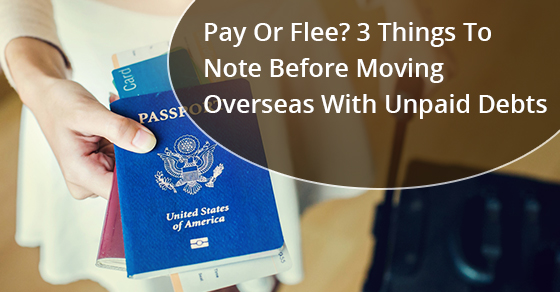Moving abroad to escape your credit card debt might sound like a good idea, considering there are different systems and regulations in each country when it comes to assessing a person’s credit. Especially since it’s unlikely that a foreign lender would ask for a copy of a Canadian-based credit report.
However, defaulting on your debts by moving abroad doesn’t necessarily mean the debt you leave behind will disappear. Depending on the creditor(s) you owe, and the extent they’re willing to chase you for the payment, they have several options to collect their money.
Here’s a few things to keep in mind:
You still have an obligation to clear your debts
Just because you’ve left the country doesn’t mean the contract you signed with your creditor is now void. If the creditors are unable to collect the money because you’ve moved out of the country, they can still put a marker on your account or obtain a judgement, making it harder to open up new accounts locally or maintain the credit line you had achieved on existing ones.
Difficult transition overseas
Your failure to make the required payment will be reported to the Equifax and TransUnion bureaus, so your credit will inevitably be affected. Although this does not have much impact outside Canada, a low score might limit your credit options in the new country until you prove to your new lenders that you have steady income. Moreover, if you lose the ability to use your local cards in your new country, you will have a tough time making the transition and settling in.
Civil legal action
A lawsuit is filed in the country or region where the debtor lives. So if the creditors file a lawsuit and serve you the papers prior to your departure, then the lawsuit won’t go away even after you leave. It will continue in your absence. And if the creditors are successful, they can acquire any asset(s) you left behind.
If you leave before the lawsuit has been filed, the creditors would have to bring the suit to your country of residence, which means hiring counsel in that area and abiding by the rules and procedures of that country. This can be very difficult for the creditors, especially if they’re unable to locate you.
Pay or flee?
Although creditors are unlikely to chase you around the world for small debts, say anything below $20,000, it is still in your best interest to pay all your debts before leaving, or at least keeping them current. This will ensure that you don’t lose any local assets, in case they file a lawsuit and win. It will allow you to refer to your good local credit score to access higher credit abroad, plus you might want to come back to Canada, and again find yourself in a financial bind.
If you have trouble keeping up with your payments, and are planning to leave the country, you should talk with a finance professional about bankruptcy, or a debt consolidation.

